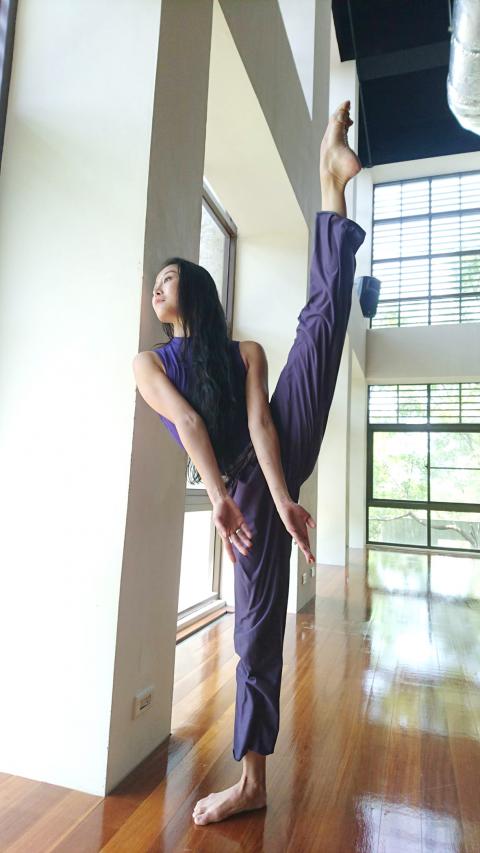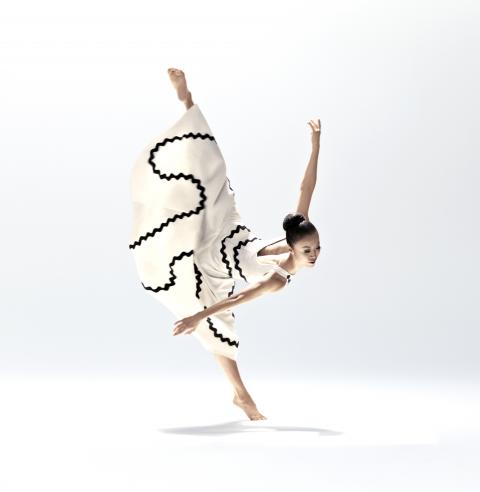The eyes of the nation will be on the Taipei Municipal Stadium tonight as the opening ceremony of the 2017 Taipei Summer Universiade gets under way at 6pm, including friends and family of the hundreds of Taiwanese dancers, university students and high-school students who will be performing.
Given one of the themes of the local and international advertising that Taipei has been running for the Games is “Taipei in Motion,” it should come as no surprise that dancers were given a key role in the welcoming event. If there is one thing that dancers know even more about than athletes, it is motion.
Wang Yun-yu (王雲幼), dean of Taipei National University of the Arts (TNUA) School of Dance, was asked to be the chief production director for the Games.

Photo courtesy of Zhang Xiao-xiong
Asked how long it took to pull the show together, Wang laughed and said the process began in January last year, when the storyline was finalized and she could start to invite choreographers, schools and dancers.
Three directors were chosen for the three cultural program segments of the ceremony: Anarchy Dance Theatre founder Jeff Hsieh (謝杰樺), theater director Liao Ruo-han (廖若涵) and visual artist Lin Kun-ying (林昆穎).
Wang said she wanted young, mid-career professionals as choreographers and designers because she wanted to promote youth, and she also wanted to highlight the nation’s wealth of professional dancers, as well as its dance students.

Photo courtesy of Hibbard Nash
About 100 modern dancers and more than 900 dance students are taking part in the ceremony, Wang said.
National Taiwan University of Sport, the National Taiwan College of Performing Arts, TNUA, Hwa Kang Arts School, the Aboriginal divisions and dance divisions at five municipal senior-high schools and four junior-high schools in New Taipei City and Taipei are contributing performers.
Many of the choreographers have their own companies, which meant they had to set aside their own work to help — such as Horse cofounder Su Wei-chia (蘇威嘉); Formosa Aboriginal Song and Dance Troupe director Fangas Nayaw; and Benson Tsai (蔡博丞) of B.DANCE.
Others are freelancers, such as Tung I-fen (董怡芬) and Shen Yi-wen.
Wang also wanted to get Taiwanese expatriates involved, so she recruited Martha Graham Dance Company principal dancer Chien Pei-ju (簡珮如) and Billy Chang Yi-chun (張逸軍), a former soloist with Cirque du Soleil, to perform, and Lin Li-chuan (林立川), who danced with the Atlanta Ballet and other companies, to choreograph.
Some of the choreographers started going to the schools in February to work with the students, but the real training began in April, Wang said.
In the past two weeks everything moved into high gear, with rehearsals at TNUA, the small stadium next to the Taipei Municipal Stadium and at buildings at Taipei International Airport (Songshan airport).
The entire cast and production had their first full dress rehearsal on Tuesday night and a second one on Thursday night.
The performers feel they are “performing for the entire nation, to show that Taiwan is not so small a place,” Wang said.
For Chien, the invitation from Wang to join the cast was a welcome chance to come home to perform.
“I didn’t think much about it, just said yes,” she said in a telephone interview yesterday. “It was a dream come true. Living in New York for 10 years, I have wanted to come back to perform and had been planning to come for the last three years, but things didn’t work out before.”
She arrived back in Taipei about two-and-a-half weeks ago and immediately began rehearsals.
“It’s been crazy this week, running back and forth between the studios at TNUA in the morning and the stadium in the evening,” she said. “It is exciting, but at the same time tense because everyone is trying to do their best.”
An added difficulty for Chien is that she will actually be dancing on LED panels, or “dancing on a big TV,” as she put it.
“As a dancer on stage, I always have to take care of my movements, my emotions, my acting, but now I have to worry about how I look on the TV,” she said. “But it’s very cool.”
The cultural segments of the performance aim to highlight Taiwan’s past, present and future under the themes nature, city and technology.
The first, titled “Vibrant Island,” will highlight Taiwan’s Aboriginal and local culture, and features a performance by Puyuma singer Sangpuy Katatepan Mavaliyw.
The second, “Hybrid Taipei,” aims to convey the sights, sounds and tastes of the city, and will feature performances by Chang, rock band Boxing (拳) and Amis pop singer A-Lin (Huang Li-ling, 黃麗玲).
The third segment, “Global Tribe,” highlights Taiwan’s digital connections with the world and features Chien’s solo, violinist Tseng Yu-chien (曾宇謙) and Taiwanese-American singer and actor Wang Leehom (王力宏).
Wang’s portion of the finale will be interactive for those inside the stadium, who will be able to participate by downloading an app that will turn their phones into instruments.
While tickets to the opening ceremony are sold out, it will be broadcast live on TV and the Internet and shown on six big screens set up in the Taipei City Hall plaza.

Chinese Nationalist Party (KMT) Chairman Eric Chu (朱立倫), spokeswoman Yang Chih-yu (楊智伃) and Legislator Hsieh Lung-chieh (謝龍介) would be summoned by police for questioning for leading an illegal assembly on Thursday evening last week, Minister of the Interior Liu Shyh-fang (劉世芳) said today. The three KMT officials led an assembly outside the Taipei City Prosecutors’ Office, a restricted area where public assembly is not allowed, protesting the questioning of several KMT staff and searches of KMT headquarters and offices in a recall petition forgery case. Chu, Yang and Hsieh are all suspected of contravening the Assembly and Parade Act (集會遊行法) by holding

PRAISE: Japanese visitor Takashi Kubota said the Taiwanese temple architecture images showcased in the AI Art Gallery were the most impressive displays he saw Taiwan does not have an official pavilion at the World Expo in Osaka, Japan, because of its diplomatic predicament, but the government-backed Tech World pavilion is drawing interest with its unique recreations of works by Taiwanese artists. The pavilion features an artificial intelligence (AI)-based art gallery showcasing works of famous Taiwanese artists from the Japanese colonial period using innovative technologies. Among its main simulated displays are Eastern gouache paintings by Chen Chin (陳進), Lin Yu-shan (林玉山) and Kuo Hsueh-hu (郭雪湖), who were the three young Taiwanese painters selected for the East Asian Painting exhibition in 1927. Gouache is a water-based

Taiwan would welcome the return of Honduras as a diplomatic ally if its next president decides to make such a move, Minister of Foreign Affairs Lin Chia-lung (林佳龍) said yesterday. “Of course, we would welcome Honduras if they want to restore diplomatic ties with Taiwan after their elections,” Lin said at a meeting of the legislature’s Foreign Affairs and National Defense Committee, when asked to comment on statements made by two of the three Honduran presidential candidates during the presidential campaign in the Central American country. Taiwan is paying close attention to the region as a whole in the wake of a

OFF-TARGET: More than 30,000 participants were expected to take part in the Games next month, but only 6,550 foreign and 19,400 Taiwanese athletes have registered Taipei city councilors yesterday blasted the organizers of next month’s World Masters Games over sudden timetable and venue changes, which they said have caused thousands of participants to back out of the international sporting event, among other organizational issues. They also cited visa delays and political interference by China as reasons many foreign athletes are requesting refunds for the event, to be held from May 17 to 30. Jointly organized by the Taipei and New Taipei City governments, the games have been rocked by numerous controversies since preparations began in 2020. Taipei City Councilor Lin Yen-feng (林延鳳) said yesterday that new measures by